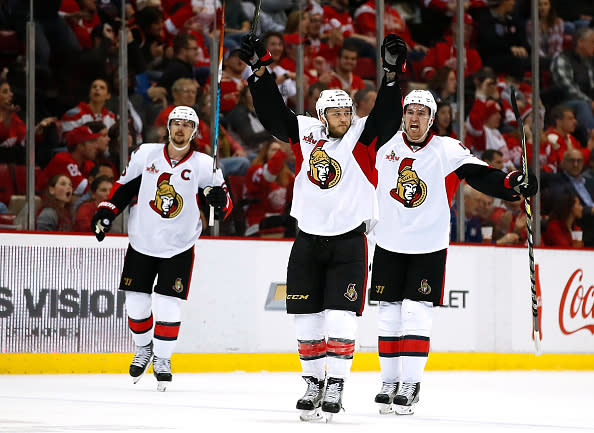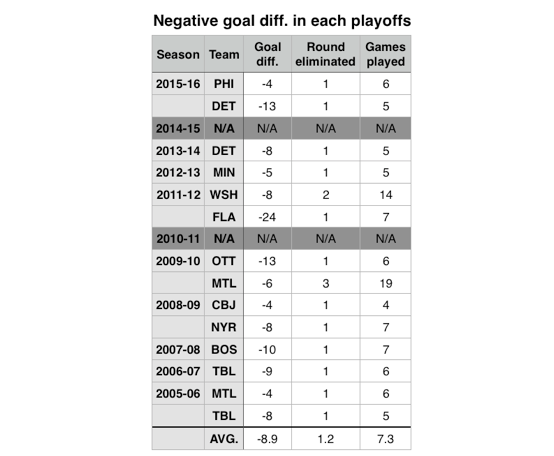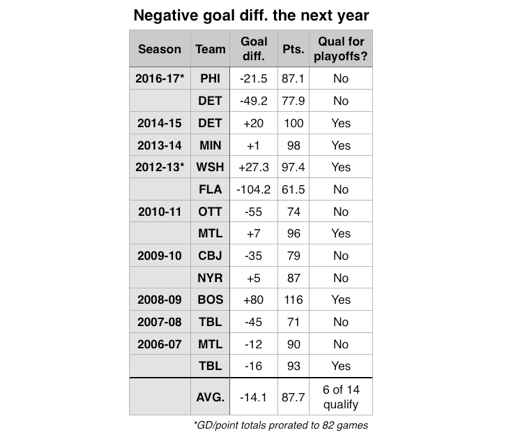Playoff field could be rare in modern NHL (Trending Topics)

It’s only happened twice since the introduction of the shootout. It might happen again this year too.
Depending upon how things go over the next few games for the Ottawa Senators, this might be just the third season in the past 12 seasons in which no team with a negative goal differential made the playoffs. After Thursday night’s game win over the Boston Bruins, the Senators have been outscored by their opponents over the course of the entire season to date by three goals. They have two games left to improve that number, against the New York Rangers (Friday) and New York Islanders (Sunday).
[Follow Puck Daddy on social media: Twitter | Instagram | Facebook | Tumblr]
For the record, after Thursday’s game with the Toronto Maple Leafs, the Tampa Bay Lightning are still alive, and their goal differential is a tenuous plus-one.
If they get above even, which at this point seems like a bit of a stretch, they’ll join the 2010-11 and 2014-15 Anaheim Ducks as the teams with the lowest goal differentials in the playoffs who didn’t enter the postseason in the red, goals-wise.
The thing one has to remember about goal difference is that it’s not always an indicator of future success, but if you’re in the negative over 82 games it’s probably because you’re not a very good team. Teams that made the playoffs with a sub-zero differential tend to play and win a lot of one-goal games, which isn’t a sustainable model for success, and they also tend to give up a lot of goals in spurts. Stands to reason that the only way you make the playoffs while getting outscored is by having bounces go your way for a big chunk of the season. They probably also did the old Florida Panthers trick of winning a ton of shootouts, which don’t count toward their goal totals.
In all, 14 teams made the past 11 playoffs while allowing more goals than they scored. In terms of goals for and against, that 2011-12 Florida Panthers team was the worst of them, allowing 24 more goals than they scored over the course of 82 games. In fact, only four of those teams had negative goal differences in the double-digits: last year’s Detroit Red Wings, the 2009-10 Senators, and the 2007-08 Bruins.
Here’s something that shouldn’t surprise you: All those teams were, in fact, quite bad and got bounced quickly from postseason play. That, too, stands to reason: Teams with negative goal differentials tend to finish fairly low in the standings for obvious reasons, and when you do that, you have to play actual good teams for as many as seven games. Most don’t last anywhere near that long.

Only two of those teams made it out of the first round at all, and both did so on the back of high-level goaltending. Who can forget Jaroslav Halak (.923 in those playoffs, but .933 before Philly destroyed them in five in the Conference Final) being the first one to really staple the “choker” label onto Alex Ovechkin’s forehead? A few years later, it was the Washington Capitals’ turn to advance despite so-so performances thanks almost entirely to goaltending, as Braden Holtby was lights-out in the entire postseason (.935, though that number is somehow below his career playoff average of .937; wow, he’s good).
While only one of these teams actually got swept, four more won just one game out of five. Another four won six, and there seems to be some misconception about whether bowing out in six games is good. It’s not. If you lose a series in six games you went .333 in that series, and the four teams above who made it that far got outscored by a combined 72-54 (minus-18, 42.9 percent GF).
The fact that the average team in this group plays 1.2 rounds and 7.3 games is instructive: If you don’t have a goalie absolutely standing on his head, you’re in a lot of trouble pretty much right away. A lot of these teams get in a punch or two and quickly go down in a heap. Again, you’d expect it because while just about any club can win any one hockey game against an elite team, being able to do so consistently, even over a seven-game set just isn’t feasible.
And again, any low seed is pretty likely to get their clocks cleaned by a high seed, but sneaking into the postseason in this manner pretty much guarantees you’re gonna get clobbered unless your goaltender gets incredibly hot.
The real problem, though, is it’s hard to get up off the mat after you make the playoffs with a negative differential. Again, it’s an indicator that your team was both very lucky and probably not very good. Only six of the 14 teams in question qualified for the playoffs the next season as well. And the same number (though not the same teams) were able to improve their goal differentials above break-even.

There are some extreme outliers in there, obviously, but the general feel of these numbers is about right.
Look at what those teams that were able to make it the next year mostly have in common: Great goalies (Thomas, Lundqvist, Price, Holtby) or at least a mediocre goalie having a great season (Harding, Mrazek), and often, at least one or two elite players at most outfield positions.
So the question if Ottawa can’t improve (and frankly, even if they can) is how repeatable a playoff appearance is. Yeah they’re in, but anyone they play is a demonstrably better team. And will almost certainly have a better chance to make the playoffs again next year.
[Join a Yahoo Daily Fantasy Hockey contest now]
They say making the playoffs is an accomplishment, and I guess it in a way. But once you actually get there, you pretty quickly learn that it’s a a pretty harsh meritocracy.
Some actual good team is gonna send your negative goal differential to the golf course and, more often than not, keep it there for at least another year.
Ryan Lambert is a Puck Daddy columnist. His email is here and his Twitter is here.
All stats via Corsica unless otherwise stated.
MORE FROM YAHOO HOCKEY:

 Yahoo Sports
Yahoo Sports 

